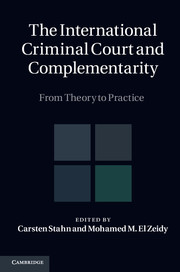Book contents
- Frontmatter
- Contents
- Acknowledgments
- Foreword by HE Judge Sang-Hyun Song
- Foreword by Patricia O’Brien
- Foreword by Silvia A. Fernandez de Gurmendi
- List of abbreviations
- Introduction: bridge over troubled waters?
- PART I General reflections
- PART II Origin and genesis of complementarity
- PART III Analytical dimensions of complementarity
- PART IV Interpretation and application
- PART IV (Continued) Interpretation and application
- 21 States’ obligations to investigate and prosecute perpetrators of international crimes: the perspective of the European Court of Human Rights
- 22 The law and policy of complementarity in relation to ‘criminal proceedings’ carried out by non-state organized armed groups
- 23 Complementarity and the crime of aggression
- 24 Complementarity and alternative forms of justice
- 25 Complementarity and ‘reverse cooperation’
- 26 In the hands of the state: implementing legislation and complementarity
- PART V Complementarity in perspective
- PART VI Complementarity in practice
- Index
- References
21 - States’ obligations to investigate and prosecute perpetrators of international crimes: the perspective of the European Court of Human Rights
from PART IV (Continued) - Interpretation and application
Published online by Cambridge University Press: 05 November 2014
- Frontmatter
- Contents
- Acknowledgments
- Foreword by HE Judge Sang-Hyun Song
- Foreword by Patricia O’Brien
- Foreword by Silvia A. Fernandez de Gurmendi
- List of abbreviations
- Introduction: bridge over troubled waters?
- PART I General reflections
- PART II Origin and genesis of complementarity
- PART III Analytical dimensions of complementarity
- PART IV Interpretation and application
- PART IV (Continued) Interpretation and application
- 21 States’ obligations to investigate and prosecute perpetrators of international crimes: the perspective of the European Court of Human Rights
- 22 The law and policy of complementarity in relation to ‘criminal proceedings’ carried out by non-state organized armed groups
- 23 Complementarity and the crime of aggression
- 24 Complementarity and alternative forms of justice
- 25 Complementarity and ‘reverse cooperation’
- 26 In the hands of the state: implementing legislation and complementarity
- PART V Complementarity in perspective
- PART VI Complementarity in practice
- Index
- References
Summary
Although the European Court of Human Rights and the International Criminal Court (‘ICC’) operate within a different legal context and have different functions and goals, these courts definitely share some common ground. Both courts are expected to exercise subsidiary jurisdiction. The ICC's principle of complementarity dictates that a case is only admissible before the Court if a state is ‘unwilling or unable’ to carry out investigations and prosecute itself. In respect of the European Court, the court's subsidiary position comes to the fore in the ‘exhaustion of local remedies’ rule and in the provision that victims should enjoy an effective remedy under national law to have violations of their rights redressed (Article 13 ECHR). The philosophy sustaining the courts’ procedures emphasizes the primary obligations of states to deal adequately with human rights violations and international crimes.
This chapter seeks to explore whether the standards that have been developed by the European Court to expose member states as ‘under-achievers’ in respect of their procedural obligations may equally serve the ICC as useful guidelines in its assessment of ‘unwillingness’. The analysis of the European Court's case law indeed reveals that those standards bear striking resemblance to the Rome Statute's indicators of ‘unwillingness’. Section 4 of the chapter puts the findings and assumptions to a critical test. After all, the distinctive aims of the courts should not be ignored. Whereas the ICC may primarily be interested in the substantive quality of the state's administration of criminal justice, the European Court is likely to stress the fairness of criminal procedures. In spite of these different perspectives, so the chapter concludes, the standards of the European Court on procedural obligations serve the ICC as a highly useful frame of reference in order to find its way in largely uncharted terrain.
- Type
- Chapter
- Information
- The International Criminal Court and ComplementarityFrom Theory to Practice, pp. 685 - 706Publisher: Cambridge University PressPrint publication year: 2011
References
- 1
- Cited by



